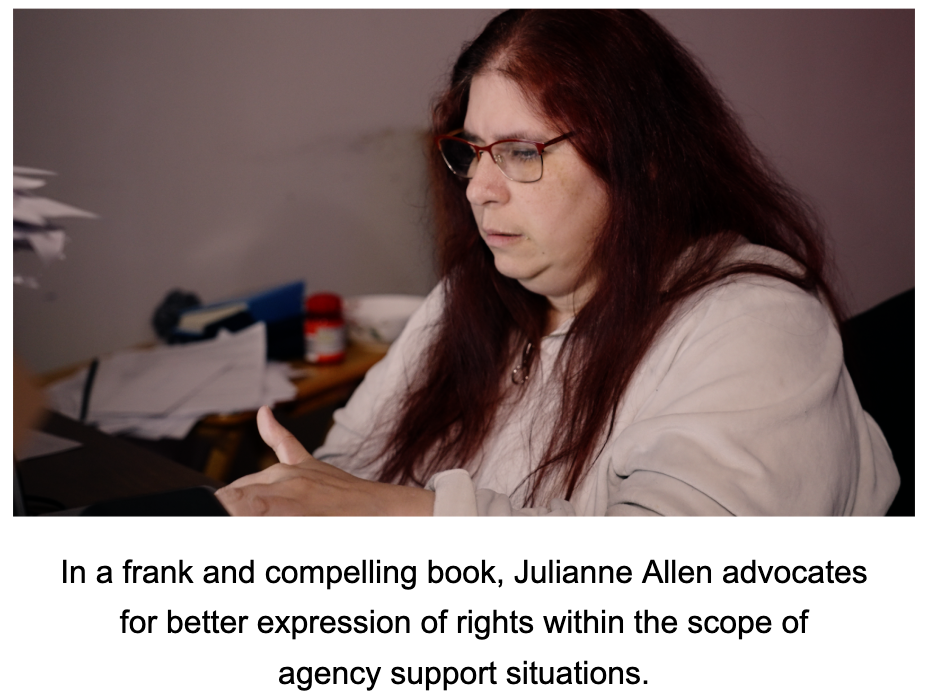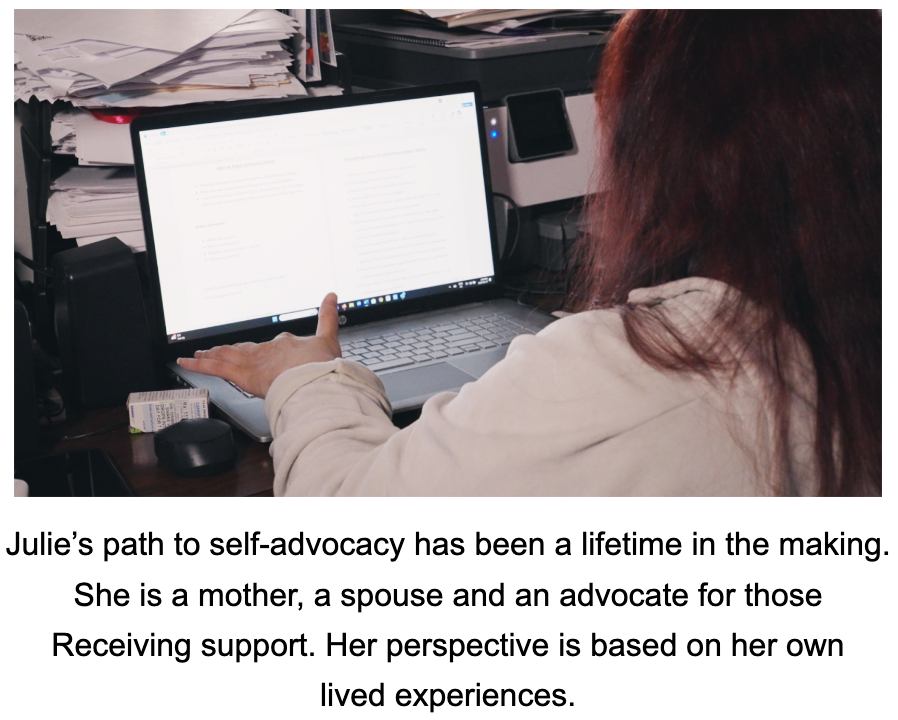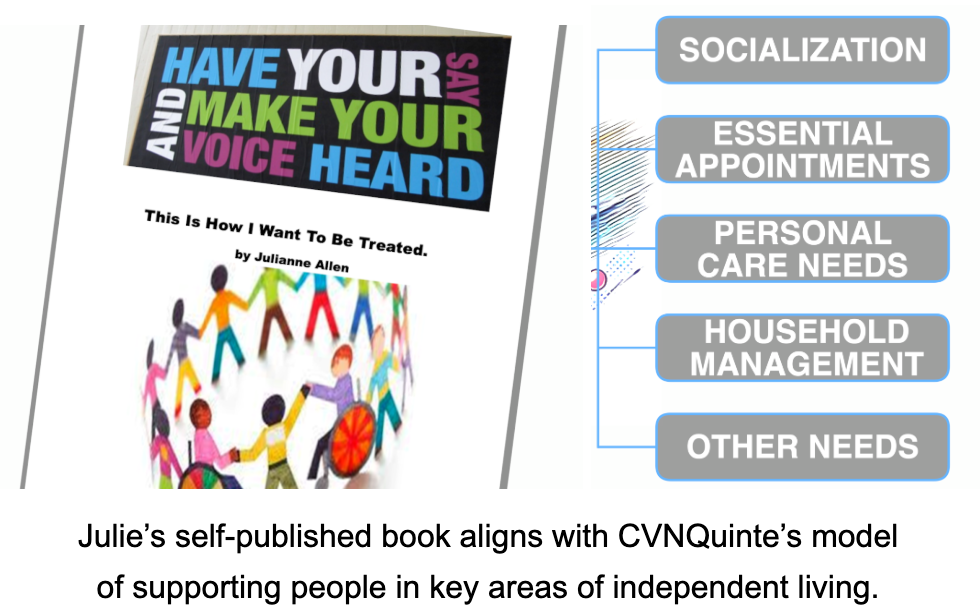The Power of Choice: Julianne Allen’s Advocacy for Respect and Rights at CVNQuinte
 Julianne (Julie) Allen is a passionate advocate, educator, and former board member of CVNQuinte—an organization dedicated to ensuring that people receiving support have the power of choice. But Julie is not just an advocate in name; she is also a person who receives services from CVNQuinte, bringing a lived experience that informs her work and fuels her mission.
Julianne (Julie) Allen is a passionate advocate, educator, and former board member of CVNQuinte—an organization dedicated to ensuring that people receiving support have the power of choice. But Julie is not just an advocate in name; she is also a person who receives services from CVNQuinte, bringing a lived experience that informs her work and fuels her mission.
Her book, This Is How I Want to Be Treated, is a powerful guide that lays out the “rights and responsibilities of people receiving support”, as well as the expectations for support workers and agencies. At its core, her book and her advocacy are about one thing: choice.
“You have choices. You have rights. And you should know your rights,” Julie says, reflecting on why she wrote the book. “Many times, choices are not always a given.”
For Julie, choice is not just an idea—it is a right that must be recognized, respected, and exercised.
A Life Built on Choice
Julie’s journey toward self-determination began with a bold act of independence. At 18, she realized that she wanted to live on her own, but her mother did not believe she could. Her solution? She packed her bags and left.
“It was the best decision I ever made,” she says. “I found out who I am, what I’m good at, and what I’m passionate about.”
This early experience cemented her belief that “every person deserves the right to make their own decisions”—from where they live to who they allow into their lives as support workers.
 CVNQuinte was the first agency she worked with, and from the start, they treated her as the decision-maker in her own life. Unlike traditional models where agencies assign support workers, CVNQuinte asked Julie a simple but profound question: “Do you want to interview your support workers?”
CVNQuinte was the first agency she worked with, and from the start, they treated her as the decision-maker in her own life. Unlike traditional models where agencies assign support workers, CVNQuinte asked Julie a simple but profound question: “Do you want to interview your support workers?”
When she recovered from the pleasant surprise, her answer was immediate: “That would be awesome,” she recalls.
“They sat down with me, asked me what I wanted, what I needed, and they let me decide,” she recalls. “From that moment on, I’ve always chosen the people who come into my home.”
Choice in Action: A Real-Life Example
Julie’s advocacy for “real, everyday choices” isn’t just theory—it plays out in her life every day. During the interview that led to the article you’re reading right now, Julie received a phone call from her CVNQuinte direct support worker.
The issue? A small financial mix-up at a grocery store where her worker was making a purchase on her behalf.
Instead of making a decision for Julie, the worker did exactly what Julie expects—she called her to ask what she wanted to do.
“Do you want me to cover it for now, and you can pay me back?” the worker asked.
Julie quickly assessed the situation and made her choice: “Yes, I’ll pay you back.”
This small moment may seem routine, but it represents something profound. Julianne was consulted, not bypassed. She was given the information and the choice. And that is exactly what self-directed support is about.
“That’s what respect looks like,” Julianne says. “It’s my decision. My money. My choice.”
Advocating for Change, Educating for the Future
Julie’s work extends beyond her own experiences. She has spent years advocating for the rights of people supported, serving on the Council of Community Living Ontario and co-teaching employee training sessions at CVNQuinte.
 She believes that real change happens through education—for both individuals and support workers. That’s why her book doesn’t just outline the rights of people receiving support—it also defines the responsibilities of support workers and agencies.
She believes that real change happens through education—for both individuals and support workers. That’s why her book doesn’t just outline the rights of people receiving support—it also defines the responsibilities of support workers and agencies.
“Every relationship is a two-way street,” Julie explains. “I know I have rights, but I also recognize that support workers have rights too. It’s about mutual respect.”
Her next goal? Julie is currently exploring a partnership to widen her influence in the community. She envisions a world where businesses understand how to communicate, hire, and welcome people of all abilities—without hesitation or awkwardness.
“I want to teach businesses how to talk to people who are disabled,” she says. “Just to understand that we’re here, and we have skills, and we want to contribute.”
At the ❤️of Her Message: I Am Not Broken
One of the most powerful quotations employed in Julie’s book is also one of her personal mottos:
“I am not broken, so you don’t have to fix me.”
“Yes, I have one side that doesn’t work,” she says, referring to her physical disability. “But that doesn’t mean I can’t do things. It just means I do them differently.”
For Julie, the biggest barrier isn’t her disability—it’s the assumptions people make about her. The stares. The way people talk to her support workers instead of directly to her. The expectation that she needs to be fixed instead of respected.
Her message is clear: Treat people as individuals. Talk to them, not around them. Recognize their abilities, not just their disabilities.
A Future of Possibilities
Julianne Allen is not just writing about change—she is living it. Through her book, her advocacy, and her everyday choices, she is showing that true empowerment comes from being heard, respected, and included.
CVNQuinte continues to be a model for what self-directed support can look like—where individuals are decision-makers in their own lives, not passive recipients of care.
Julie’s parting words serve as a call to action:
“I want individuals to know their rights and how to advocate for themselves. And I want support workers to know that we have choices. It’s not about them. It’s about us.”
With her voice, her work, and her unstoppable drive, Julie is ensuring that choice isn’t just a privilege—it’s a right.
Learn more about the power of choice in this special CVNQuinte micro-documentary:

